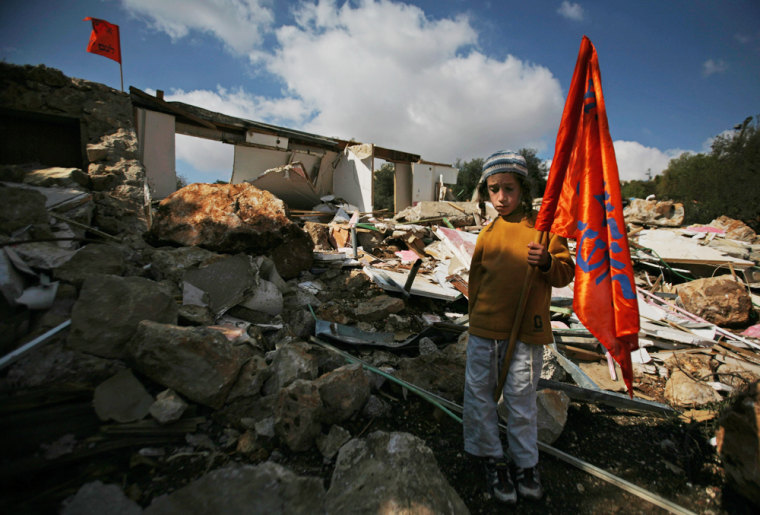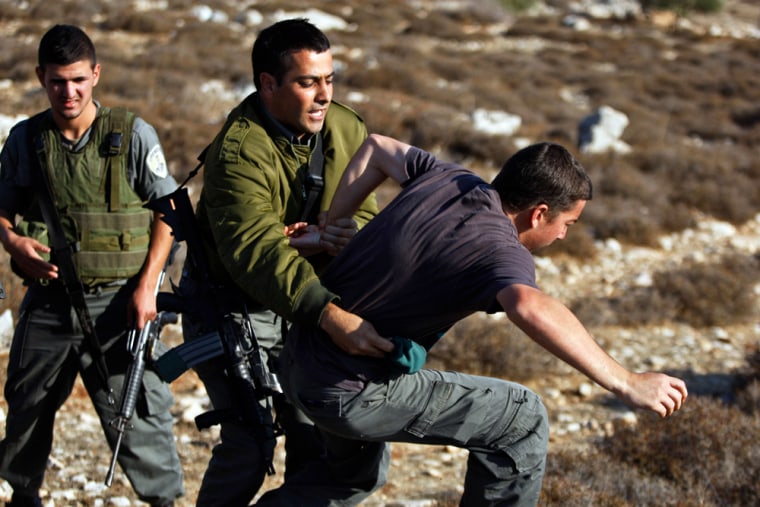Israel has announced it will get tough with West Bank settlers breaking the law and halt funding of illegal settlement outposts, but settler leaders and the government's dovish critics said Monday they don't believe much will change on the ground.
Israel's ambivalent policy toward the dozens of settler squatter camps was on display Monday, a day after the government decision.
Near the hilltop outpost of Migron, Israeli security forces tore down several shacks that had been set up several months ago as an "outpost of an outpost."
Yet army guards continued to protect Migron, which is linked to the electricity grid and has a paved access road. Immediately after the security forces left, about two dozen teens led by settler firebrand Daniella Weiss were rebuilding the shacks.
Israel distinguishes between government-approved settlements and dozens of satellite settler camps that have sprung up since the 1990s without formal government blessing. There is broad international consensus that all construction on captured territory is illegal.
Growing concern about violence
Sunday's government decision comes at a time of growing concern in Israel about a rise in violence among the most extremist of the nearly 300,000 West Bank settlers.
Yuval Diskin, the head of Israel's Shin Bet security service, told the Cabinet on Sunday that an Israeli withdrawal from parts of the West Bank, as part of a peace deal with the Palestinians, would likely set off widespread clashes with settlers and possibly armed conflict. Any withdrawal would mean uprooting thousands of settlers from their homes.
The Cabinet approved a series of steps, including cracking down on settler vigilantes and halting "all direct or indirect financial support of illegal outposts and their infrastructure," a statement said.
Government spokesman Mark Regev said the Cabinet formed a committee headed by Defense Minister Ehud Barak and gave it two weeks to report back on what steps it had taken.
Government helped support camps
Israel never formally decided to support outposts, but an official 2005 report found that successive Israeli governments have helped build and expand the squatter camps in violation of promises to the United States.
Settlers have been setting up outposts since the mid-90s, after Israel said it would stop building new settlements and only expand existing ones. The outposts usually start out with a few mobile homes, a water tank and a generator. They are designed to expand control over land and ultimately prevent the establishment of a Palestinian state.
In 2003, as part of the U.S.-backed "road map" peace plan, Israel promised the U.S. to dismantle about two dozen outposts, but has not complied. Instead, Barak has been negotiating the fate of the outposts with the Yesha Council, the settlers' umbrella group.
The most hardline settlers oppose negotiations and instead have adopted a tactic they call "price tag." Protesters block roads, turn tires or set fire to Palestinian fields whenever troops try to dismantle any part of an outpost. The idea is to create so much havoc that it will deter the security forces from trying again.
Dror Etkes, who has been leading a legal battle against outposts on behalf of the Israeli human rights group "Yesh Din," said he does not believe the government will halt its tacit support for the outposts.

"What matters is not the statements, but what happens on the ground, and everything on the ground is precisely the opposite," said Etkes.
He said the government has spent tens of millions of dollars on providing security and infrastructure for the outposts, adding that most of the funds are funneled through settler-controlled local governments known as regional councils.
One example is Givat Assaf, made up of about two dozen trailers set up since 2001 along the West Bank's main north-south road. Etkes said the outpost sits in private Palestinian land, yet is protected by the army, has a bus stop and is connected to the water system. Givat Assaf is located at a junction that leads to the army headquarters in the West Bank.
Will decision galvanize the settlers?
On Monday, a large army vehicle was parked outside the main gate. Inside the outpost, a woman sat on a bench next to a sand box, watching two toddlers at play.
The Settlers Council denounced the government's decision, saying politicians were trying to "create hatred toward settlers" as part of Israel's election campaign; the vote is set for Feb. 10.
However, Weiss, a settler leader who is pushing to build more outposts, said the decision would simply galvanize the settlers. "It has united different sections to work together to further develop the communities," she said.
